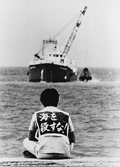In Memory of Maeda Katsuhiro

About Maeda Katsuhiro, about Polluted Japan
Maeda Katsuhiro was a third-dan judo athlete. Though I was a first dan, I thought of myself as second dan in terms of skill and assumed I could beat Maeda if he was a weak third dan. I challenged him at sumo wrestling but I always lost, no matter how many times I tried. He was well built, and his appearance was, well, I’d say he looked like a pretty tough guy. However, his looks and body strength were deceptive. He was very sensitive and gentle, and although he acted rough he was almost obsessively against fighting.
Compared to the length of his resume as an assistant director and line producer, and later on, as a producer and president of Gentosha, his career as a director was not really that productive. I guess it was because of the gentleness I just mentioned. When it came to film, he was usually looking after others, and was hardly ever the one being looked after.
Polluted Japan and Free Kwangju are two of the few films he directed. Polluted Japan is based on a book of the same title by Ui Jun, an assistant at the University of Tokyo who later moved to Okinawa University as a professor. Maeda wrote the script based on his own first-hand research. He teamed up with cameraman Takaiwa Jin and traversed Japan from Asahikawa in Hokkaido to Minamata in Kyushu to trace the scars left by industrial pollution, filming to his heart’s content. He put his all into this film.
I still cannot face up to this film, which is almost like one of Maeda and Takaiwa’s milestones, probably because of my attitude toward it as a producer. When this film was being made, I was having a tough time with Minamata Disease—A Trilogy and completely neglected Polluted Japan. Maeda couldn’t rent an editing room, so he brought editing equipment to an old storefront that Takaiwa found in Hongo, and was struggling with 15,000 feet of 16mm film. I’m sure they were surviving on instant noodles. I recall this every time I think about Maeda and Polluted Japan, and I feel so embarrassed. More than anything else, I would like to apologize to the late Maeda Katsuhiro. More than anything else.
—Takagi Ryutaro
|
Maeda Katsuhiro Born in Osaka in 1940. After working as an assistant at Kamei Fumio’s Japan Document Film, met Higashi Yoichi and worked as an assistant director, scriptwriter and producer on various Takagi Ryutaro productions, including Okinawa Islands (1968), The Gentle Japanese (1970) and A Japanese Demon (1973). In 1977, founded Gentosha and produced numerous films by Higashi Yoichi, including the award-winning A Boy Called Third Base (1977) and Natsuko of All Seasons (1980). Also produced Jewelweed Is Ripe (1984, Dir. Tsuchimoto Noriaki) and Benposuta—Children’s Republic (1990, Dir. Aoike Kenji). In addition to the two films screened at YIDFF this year, he directed a PR film for National’s refrigerator titled The Big—Natural Features (1975), and Snow and People and Road: A Record of Route 252’s Rebuilding (1976). He suffered from a cerebral infarction in 1997, and died in a fire at his home on May 2, 2003. (Okinawa Islands and The Gentle Japanese will be shown in Okinawa Program at YIDFF this year.) |
Polluted Japan
(“Kogai genron 1974”) JAPAN / 1974 / Japanese / Color / 16mm / 65 min
JAPAN / 1974 / Japanese / Color / 16mm / 65 min
Director: Maeda Katsuhiro
Photography: Takaiwa Jin, Shimizu Yoshio
Editing: Maeda Katsuhiro, Aoike Kenji
Producer: Yoneda Masaatsu
Production Company: Seirinsha Productions
Source: Siglo
Covers the history and reality of pollution in Japan from the Ashio copper mine case at the beginning of the Meiji era to the Minamata and Itai-itai diseases and Yokkaichi asthma. News footage and interviews with those affected reveal the reality of pollution.
Free Kwangju
(“Jiyu Koshu: 1980 nen 5 gatsu”) JAPAN / 1981 / Japanese / Color / 16mm / 25 min
JAPAN / 1981 / Japanese / Color / 16mm / 25 min
Director: Maeda Katsuhiro
Photography: Kobayashi Tatsuhiko
Recitation: Ito Soichi, Jeung Gyung-mo
Music: Takahashi YujiPoetry: Shiba Mitsuyo
Drawing: Tomiyama Taeko
Producer: Komatsubara Tokio
Production Companies: Gentosha, Hidane Productions
Source: Montage
A passionate depiction of the Kwangju uprising, which protested the military regime’s brutal oppression of pro-democracy demonstrations in Kwangju, South Korea. With illustrations by Tomiyama Taeko, music by Takahashi Yuji and the poetry of Shiba Mitsuyo, this film is a requiem for the people of Korea.
• Special Invitation Films | DV2 | Sound of Brasil | Number Zero | <In Memory of Maeda Katsuhiro> Polluted Japan, Free Kwangju | Magino Village—A Tale |
